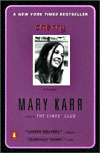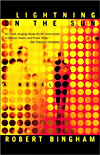
Two new paperbacks make for entertaining reading
by John Sewell
Alas, the much maligned paperback. In critical circles, the softcover format is universally derided as lacking in worth. This syndrome is quite similar to the good old indie vs. major labels debate in music. Paperbacks are usually presented as a secondary pressing, arriving at booksellers around a year after the hardcover release. And paperback status is usually awarded only to those books which promise commercial acceptance.
Many in the ivory towers of literary criticism prefer not to review paperbacks—both because of the timeliness factor (a paperback release is after the fact) and because of critical snobbery. But here at Metro Pulse, we break all the rules.

Hot off the New York Times bestseller list is Mary Karr's Cherry (Penguin Books, $14). Karr has returned to the fore with a sequel to The Liar's Club, but this time around the protagonist's hormones are surging. That's right, it's yet another coming-of-age memoir.
As with any and every adolescent rite-of-passage novel, the Salinger comparison is inevitable. In truth, however, Karr has a lot more in common with Philip (Portnoy's Complaint) Roth or an oversexed Judy Blume. Cherry is a retrospective look at the sexual freedom of the early '70s in which frequent carnal couplings and copious ingestion of drugs is reported with a wink and a smirk. And believe it or not, this lack of retrospective moralizing is refreshing.
Readers are invariably forced to ponder the ratio of fact and fiction in Karr's memoir. Though there is much mention of the confusion, self-revulsion and ineptitude of budding sexuality, Karr generally presents her story as a wild ride with few consequences. Readers can surely find a thing or two in common with the protagonist, though they will be hard-pressed to find any astounding revelations. Karr delivers a diverting, entertaining tale that is artfully wrought, but not great art. As entertainment, Cherry is excellent. And then you can stack it on the shelf among the deluge of similar works.
A lesser-known work, Robert Bingham's Lightning on the Sun (Anchor Books, $13) is described on the cover as thriller—an apt, if somewhat misleading description. Lightning is indeed a page turner, but it's a far cry from the usual cloak-and-dagger fare of popular literature. The protagonist definitely falls into antihero territory. And this moral ambiguity makes for a compelling character with whom readers can empathize, if not identify.

Asher is an American expatriate living in Cambodia who, after a series of mismatched career choices abroad, decides to smuggle heroin to the United States in an all-or-nothing gambit for fast cash. Cambodia's interwoven network of graft, shady deals and outright treachery provides an excellent setting for Bingham's nervy prose.
The protagonist is distanced not only from his nation of birth, but also from himself. Steeped in alienation and self-loathing and all the while seeking justification for his transgressions, Asher frequently seeks the numbness of intoxication.
"When it came to his life in Phnom Penh, there were few things of which Asher was proud. One was his third floor porch with its view of the museum and its black gardens; another was his Honda Dream; and the last was a rule he'd never broken: no drinking until the bats flew. He checked his watch...This evening was of considerable consequence for him and he badly needed a drink."
Bingham presents a complex, yet relatively easy-to-follow storyline in which Asher and his cronies attempt to pull off an international drug deal. The twists and turns of the plot are too detailed to relate in this small space; so let's just say it's a treacherous maze fraught with snares. No one survives with their idealism intact, and not everyone survives, period.
The most obvious literary comparison would be to Robert Stone's mid-'70s masterpiece, Dog Soldiers. Essentially, Lightning is the '90s version of the aforementioned novel, with a few twists of its own. The characters are even more narcissistic, amoral and detached than their antecedents. But Bingham does not idealize these sociopathic tendencies. Instead, he examines the characters' motivation and displays their similarities to the moral trade-offs of everyday life. And therein lies the novel's strength.
Bingham's personal life mirrored that of his protagonist—he often visited Cambodia and met an untimely demise at 33, shortly after the initial release of Lightning. Bingham's only other work was a collection of short stories (Pure Slaughter Value) released in 1997—a title well worth seeking out. And yet another promising literary career is snuffed out at an early age.

October 4, 2001 * Vol. 11, No. 40
© 2001 Metro Pulse
| 




